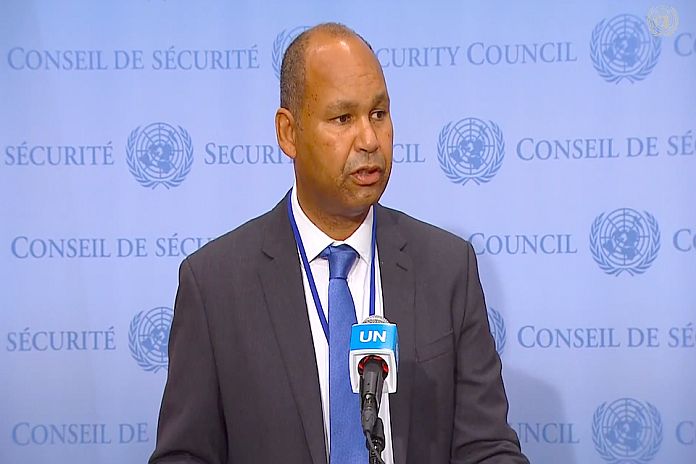Ambassador James Kariuki at the Security Council open debate on terrorism
LONDON, England – Two years on from its territorial defeat, Daesh remains a significant global threat. The recent attacks in Baghdad and the continuing violence in Syria provide further tragic evidence of that fact.
So we welcome the Secretary General’s report on the threat posed by Daesh. I would like to thank Under-Secretary-General Voronkov, Executive Director Coninsx and Dr Moradian – particularly for his moving presentation for their briefings. We are also indebted to the UN Monitoring Team, UNOCT and CTED for their important work in analysing this threat.
The UK’s position in countering Daesh is very clear. We remain an active and committed member of the Global Coalition against Daesh. We are a co-leader of the Coalition’s counter-propaganda effort and we host the Counter Daesh Communications Cell in the UK.
We continue to provide significant humanitarian and stabilisation support to those liberated areas of Iraq and Syria.
We also continue to facilitate the return of unaccompanied or orphan children on a case-by-case basis and subject to national security concerns.
However, we remain clear that those who have fought for or supported Daesh should face justice for their crimes in the most appropriate jurisdiction. Often that will be the region where those crimes were committed.
While it is vital that we focus on the immediate threats Daesh pose, we must also work together to tackle the long-term drivers of terrorism. That’s why the UK recently announced an additional £2.6 million of funding to support stabilisation in North-East Syria.
We must also remain alive to the rising threat in other geographies. What is happening now in Afghanistan is a tragedy. We will remain vigilant to the return of the terrorist threat from Afghanistan. We all share an interest in making sure Afghanistan does not again become a safe haven for terrorists.
The threat continues to grow in sub-Saharan Africa and we are providing security, stabilisation and humanitarian assistance in many affected countries to help them tackle the threat, build stability and support affected communities.
Meanwhile, Daesh continues its attempts to incite and recruit supporters around the world, particularly using social media and encrypted online platforms. Terrorism is global, and it requires a global response.
Multilateral cooperation lies at the heart of that global response. At the UN level, we welcome the continued efforts of the UNOCT, CTED and other UN agencies in supporting states to tackle it.
At the same time, we must be agile in recognising other new and emerging threats, including the use and misuse of new technologies. We should continue efforts to counter terrorist financing and extreme Right-Wing terrorism and to prevent terrorist misuse of the internet.
Finally, we believe it is important to bring our values to this effort.
When countering terrorism, we must all ensure that we protect and promote human rights, fundamental freedoms and the rule of law. We must integrate a gender sensitive and whole of society approach into our efforts. In this way, we would uphold the very principles on which the UN was founded.
The UK will remain steadfast in the global fight against terrorism and violent extremism. We will continue to stand up for our shared values and interests. And we will continue to work with our partners and through the multilateral system to that end.





